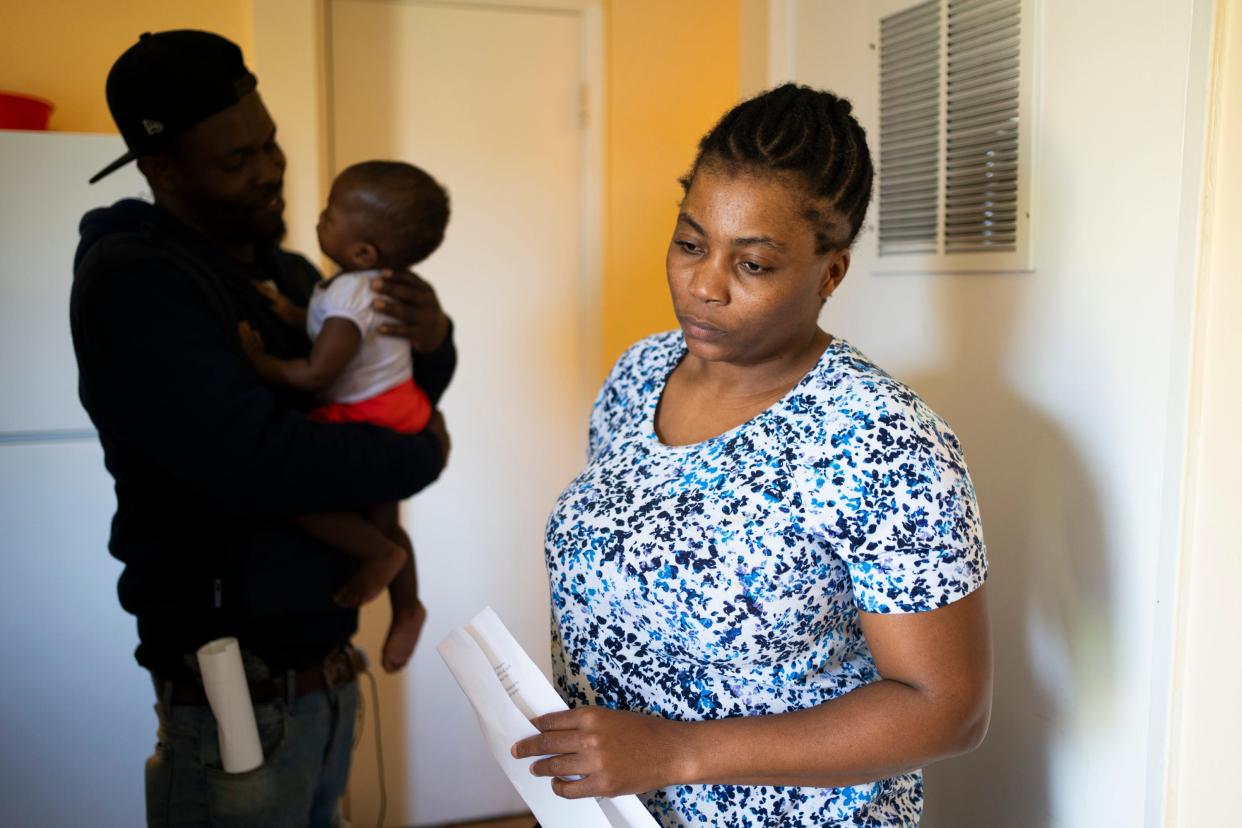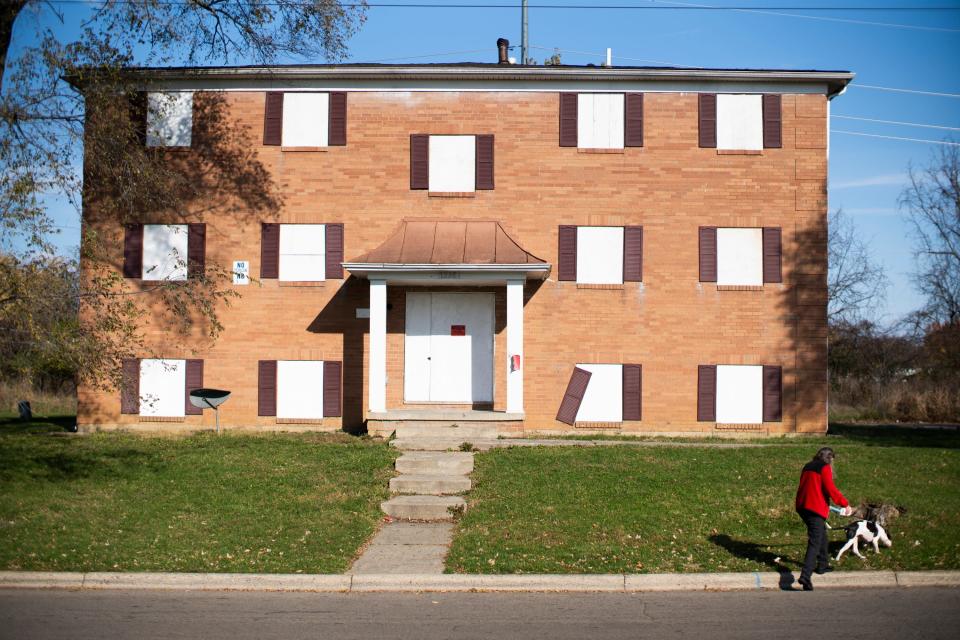Over 850 Haitian scam victims struggle in cold, unsafe Columbus apartments

- Oops!Something went wrong.Please try again later.
Roseline Paul struggles to keep her baby daughter, Cristerlene, and 5-year-old son, Cristopher, warm at night.
The mother and her children, originally from Haiti, have been living since May with four other adults and two other children in a two-bedroom apartment that lacks heat or hot water in Colonial Village Apartments on Columbus’ East Side.
Though the apartment was previously abandoned and is not up to city code, Paul said she and her roommates were tricked into paying $1,200 monthly rent to a network of human traffickers who brought them here from Florida, along with hundreds of other asylum seekers.
“This place is too small, and cold, and we’re sleeping all together,” Paul told The Dispatch through a translator on Thursday afternoon as she prepared a meal for her children on an electric stove — the only source of warmth in the apartment.
According to city officials, there are more than 850 Haitians — including at least 248 children — living in at least 215 units at Colonial Village apartments. The complex was put into receivership in March 2022 after years of city code violations and amidst a foreclosure case against its owner.
At least 128 of the Haitians’ apartments lack official leases with the complex’s management company, according to Tony Celebrezze, the city’s deputy director of Building and Zoning Services. Nonetheless, the traffickers’ network collected cash rent for those units until recently, and gave residents fraudulent rental agreements — which simply named “Colonial Village Apartments” as the landlord. City authorities have since told them to stop paying rent under those agreements.
Some, though not all, of the units at Colonial Village had been condemned. In some cases, the traffickers’ network took boards off doors and windows of units in order to rent out the apartments to Haitian families, according to Marc FeQuiere, a longtime Columbus resident and CEO and executive director of Haitian Community Network, or HaCoNet, a local nonprofit group.
The current management company, Texas-based Capstone Real Estate Services, took over at the end of October from the previous managers, Hayes Gibson, who had been there for several years. The property has been controlled by lender EFM Transfer Agent LLC and court-appointed receivers since early 2022, amidst an ongoing foreclosure case against owner Apex Colonial.
The city first learned about the situation with the Haitians on Oct. 13, according to Celebrezze. It has since ensured apartments have smoke alarms. On Thursday, the city Department of Neighborhoods and workers from the nonprofits Community Refugee and Immigrant Services (CRIS) and HaCoNet distributed blankets.
The city is calling on EFM and the current receiver, Kenneth Latz, senior managing director of Riveron ETS LLC, to either bring the units up to code or fund the relocation of residents.
However, some volunteers worry the city has not been acting quickly enough.
“Something needs to be done as soon as possible. At least have the gas company turn the gas on — it’s almost winter,” said FeQuiere. “(The city) needs to get these people a safe place to live with all the basic necessities. … and the benefits that they are qualified for, like Medicaid and food stamps, and try to get the kids enrolled in school.”

Hannah Jones, deputy director for community development at the city’s Department of Development, said the agency is planning events next week to provide residents with health care services and access to legal help, school enrollment and sign-ups for social benefits.
In a prepared statement, City Attorney Zach Klein said his priorities are “to ensure each of the affected families has access to safe, sanitary, and suitable housing, and to hold accountable those responsible for preying on these vulnerable people in the first place.”
Referencing the Latitude Five25 apartments on Columbus’ Near East Side — where over 150 residents were forced to relocate after the building was deemed unsafe last December — Klein said, “… We are using what we learned from that experience to quickly mobilize our response.”
‘I thought maybe, Ohio is a better place’
Many Colonial Village residents said they fled for their lives from Haiti, which has been rocked by gang warfare and a cholera outbreak since President Jovenel Moise was assassinated by Colombian mercenaries — some of them trained by the U.S. — in July 2021. Food insecurity and malnutrition are severe, and schools remain closed in Haiti, according to the U.N.
Haitians have fled to Central and South America, and increasing numbers have sought asylum in the U.S. Due to the ongoing humanitarian crisis in Haiti, the Biden Administration redesignated Haiti for temporary protected status earlier this year, which protects most undocumented Haitians already in the U.S. from being deported.
Greater Columbus’ Haitian community has “rapidly increased” over the past five years, according to Sorailla Duquerette, a volunteer translator who has been helping social workers communicate with Creole-speaking Haitians at Colonial Village.
Haitians in the complex told The Dispatch they came to Ohio from Florida after paying the trafficking network that arranged for them to live at the apartment complex. Among the leaders of the network was a man they knew only by his initials, “D.P.,” who they said is of Haitian origin and who has not been seen in weeks.
The residents said they paid rent in cash to live in the complex, which has faced hundreds of violations over the years for problems such as bed bugs, rodents, water and fire damage, bare and rotted wood and door framing, and unsecured vacant units.
“I thought maybe, Ohio is a better place for me to live,” said resident Joseph Baby, 26, who came from Florida a few weeks ago.
“Can you imagine — when you were down there (in Haiti), you were living in tough conditions, and then coming here hoping the condition was supposed to change, but you have people taking advantage of them. And instead of helping them, they are trying to rob them,” said Louis Dumas, an IT professional and services director for HaCoNet.
Blame game
On Oct. 13, an inspector for the lender, EFM, reported that several dozen families were staying in abandoned apartments, according to Celebrezze.
A city attorney spokesperson said that Klein’s office immediately notified the Columbus Division of Police and that detectives from both the Financial Crimes Unit and the Human Trafficking Unit have taken initial statements from some residents. They also said that they have confiscated documents and a computer from the former property manager, Hayes Gibson, and banned them from the premises.
A spokesman for the Columbus Division of Police told The Dispatch it was too early to comment on the case, including answering a question about whether Hayes Gibson employees are suspects.
Hayes Gibson is incorporated in Delaware, but its registration with the Ohio Secretary of State indicates its offices are in Santa Monica, Calif, and shares an address and personnel with a larger firm, Allied Argenta. Chuck O’Neal, who is Allied Argenta’s managing principal and listed on Hayes Gibson’s Ohio registration, did not respond Friday to a request for comment.
Attorney Keith Shumate, representing EFM, declined to comment for this story. Latz's attorney, Jim Coutinho, said Latz was not immediately available for comment.
EFM, the lender, took control of Colonial Village with support from the city in early 2022. At that time, the city attorney’s office, acting as an interested party in EFM’s foreclosure case against Apex Colonial, supported EFM’s motion to appoint a receiver for the complex. Longtime Columbus developer Rober J. Weiler Sr. was appointed receiver in March 2022, but he was replaced by Latz in April 2023.
Jones, from the city Department of Development, said that EFM should be held accountable.
“From the city's perspective, (the lenders) are the company that was responsible for hiring the receiver, and then the receiver hired the property management company. So ultimately, it is the lender’s negligence … that has allowed this to happen,” she said.

Moving forward
A spokesman for the City Attorney’s Office said it had issued a deadline of Friday for EFM and Latz to present a plan for bringing the occupied units into compliance with city code, or to find alternative housing for the residents.
Bringing the units up to code is the most feasible way forward, according to Celebrezze.
"The current safety net system here in the city can't handle an influx of 800-plus people. So, we've got to figure out how to make (the units) safe for them in the short term, and then the lender or the owner can work to figure out what they're going to do long term,” Celebrezze said.
Jean Manuel, a longtime Groveport resident and school bus driver who has been volunteering to translate Creole for city workers, agreed.
“My hope is for them to allow them to have their own lease,” said Manuel, who is Haitian American.
But Cat Gossman, a program manager with CRIS who has been working to support the residents for several weeks, said many of the buildings were in such bad condition that it was unreasonable to expect them to be brought up to code anytime soon.
“We have been just sort of waiting on the city to tell us what their plan is. I think relocation is the only option,” she said.
Whatever happens next, one thing is certain: winter is coming.
Paul said she had come to the U.S. for a better future for her kids. But for now, she is just worried about keeping them warm.
“I try to cover (Cristerlene), to keep her warm at night,” she said.
Peter Gill covers immigration, New American communities and religion for the Dispatch in partnership with Report for America. You can support work like his with a tax-deductible donation to Report for America at:bit.ly/3fNsGaZ.
pgill@dispatch.com
This article originally appeared on The Columbus Dispatch: Haitian asylum seekers struggle in cold, unsafe Columbus apartments

